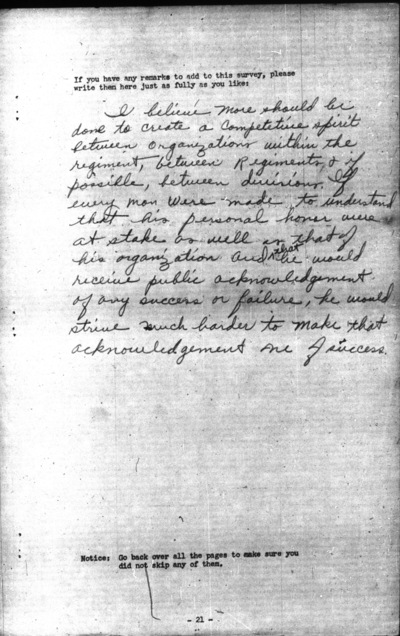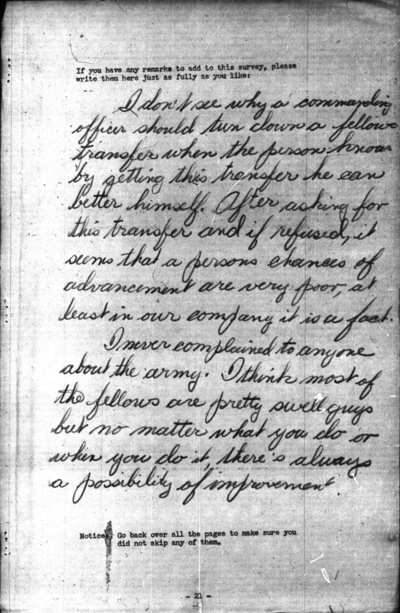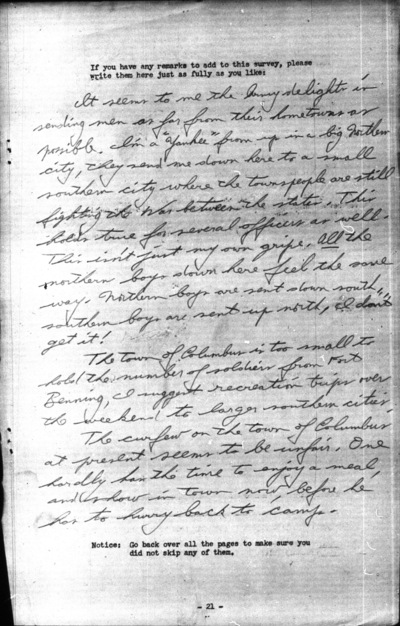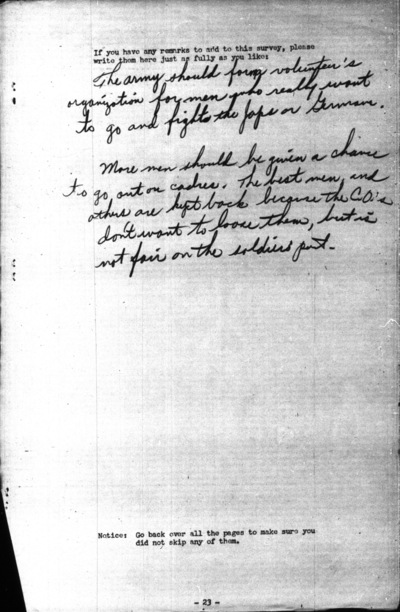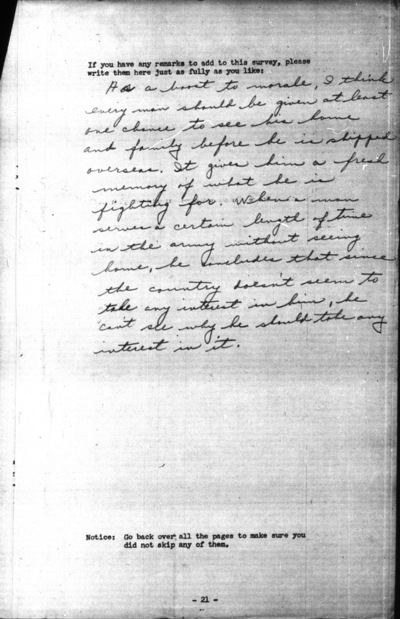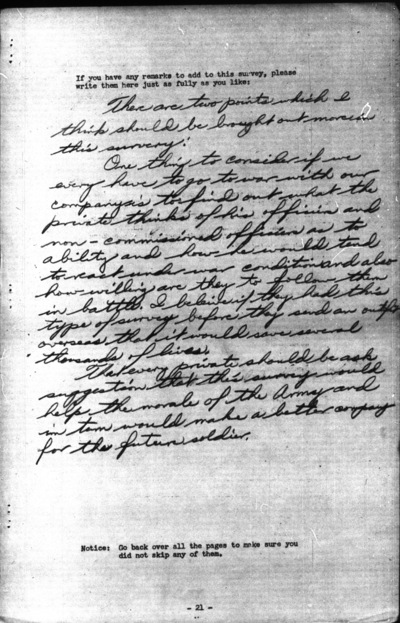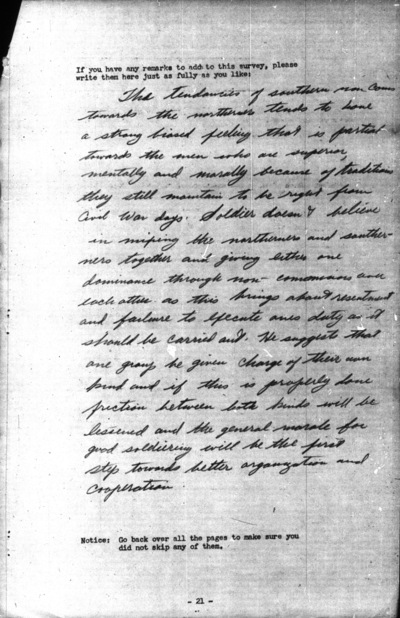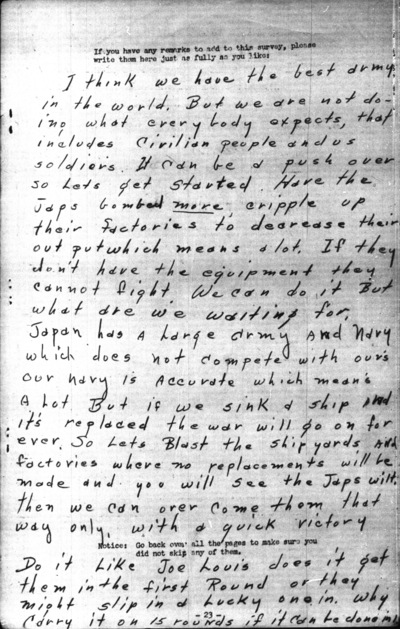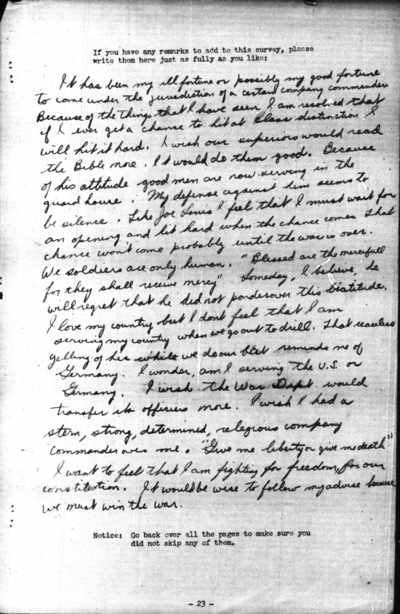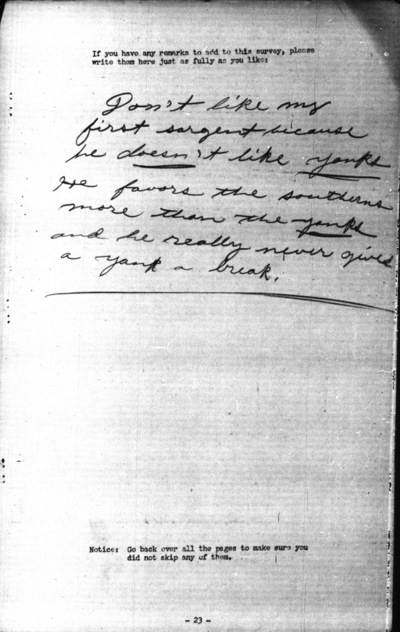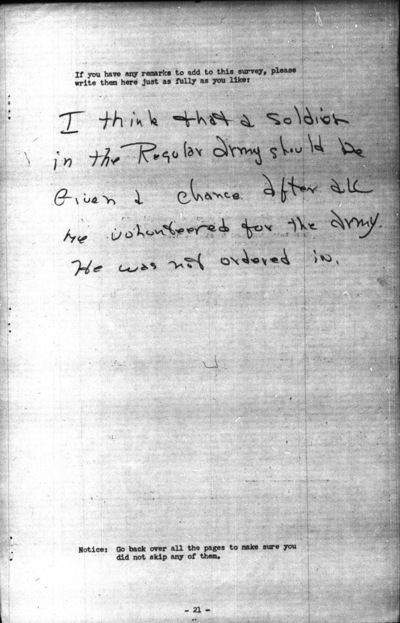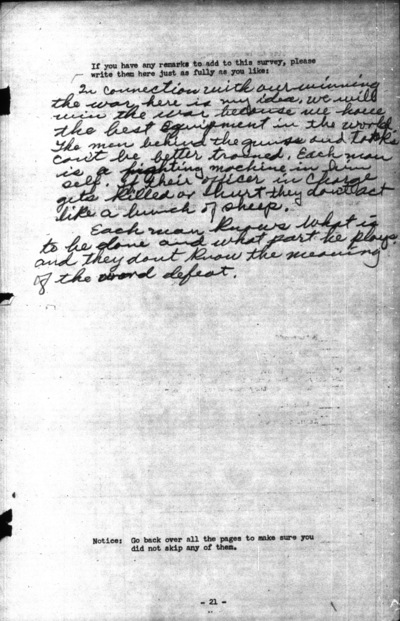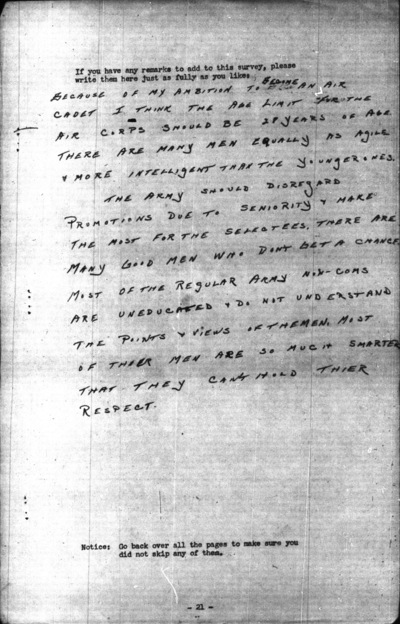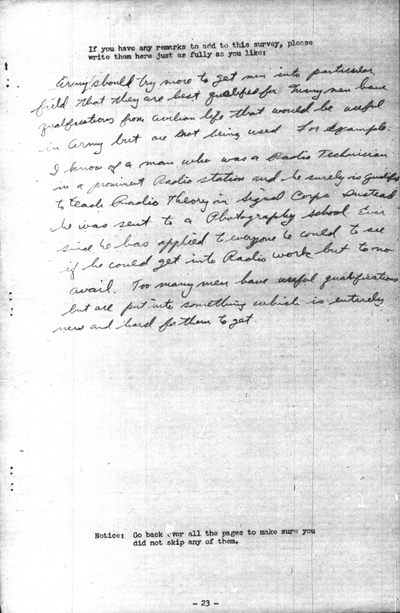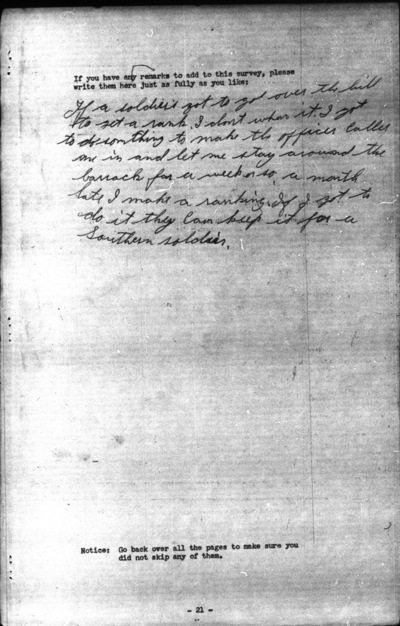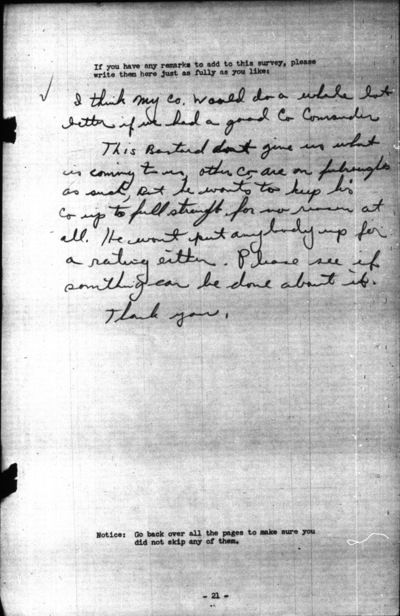PS2: Attitudes in 3 Divisions
To collect data on the attitudes of combat men in training toward various aspects of Army life important to the morale of troops.
a. The general areas covered in the study are:
- Branches of Service (all forms)
- Civilian treatment of soldiers (B-1 and C-1 only)
- Comic strips men prefer (B-1 only)
- Company punishment (all forms)
- Deferment and the Selective Service System (all forms)
- Desire for combat and service overseas (all forms)
- Financial status of soldiers (A-1 only)
- Food (all forms)
- Food - specific likes and dislikes (B-1 only)
- Infantry - opinion of (all forms)
- Laundry service (B-1 only)
- Leisure-time activities (all forms)
- Library, Use of (B-1 only)
- Medical attention (all forms)
- Moral questions (all forms)
- Movie favorites (B-1 only)
- Need for help in personal affairs (A-1 only)
- Non-commissioned officers - a special study of men's attitudes toward them (C-1 and C-2 only)
- Officers - commissioned and non-commissioned (all forms)
- Officer Candidate School - interest- in (all forms)
- Post-war optimism - pessimism (all forms)
- Radio programs preferred (B-1 only)
- Red Cross (all forms)
- Religion and church attendance (all forms)
- Segregation of white and Negro soldiers in PX, Recreation Hall and Movies (C-1 and C-2 only)
- Singing, need for and interest in (A-1 and B-1 only)
- Soldier - war worker preference (all forms)
- Sports and athletics (all forms)
- Training (all forms)
- USO (A-1) Uniform - how well fitted (B-1 only)
- Utilization of civilian skills and Army training (all forms)
- Wars length of and toughness of fight (all forms)
- War Nerves - treatment of by newspapers (all forms)
Questionnaire
Date
Original Size
Location
Sample Method
For the general case, sampling was a two-step process. First, there was sampling of organizations which can be described as purposive or quota sampling. Second, within an organization there was sampling of individuals involving procedures which might be called probability sampling.
- Selection of organizations to be included in a study: The selection of units involved purposive rather than strictly random sampling. If a cross-section of enlisted men in the United States or a theater was required, the standard procedure was to select the units such that each branch of service was represented in as nearly as possible the correct proportions. The Research Branch had access to the latest secret data on troop strength and location of units. Within a given branch of service, effort was made to get units in various stages of training or with various types of army experience in correct proportions, in so far as this could be inferred from available data. Having stratified the universe by branch and type of unit, one or more units from each subcell of this stratified universe were drawn. Practical considerations of time and personnel usually prevented a strictly random selection of units within the subcell; it was much faster to get a variety of units at a few posts than one unit at many posts. Preselection of was done in Washington for troops in the United States or at theater headquarters for troops overseas.
- Sampling of individuals within a unit: The standard method was to draw the names of every nth man from a duty roster. Or, if the study design called for certain numbers at a given rank or a given age, the research team had access to the soldier’s Form 20 cards containing all such information. For any desired category of men these cards could be sampled at random and the men whose names were drawn could be ordered to appear at a designated time and place.
- Questionnaire administration: Normally a sample of about fifty enlisted men were assembled by order of their unit commander at a place convenient for writing. The class leader was almost always an enlisted man trained for the purpose. The questionnaires were filled out anonymously by the men, it having been established that no significant differences occurred in responses with personal interviews. Men with little education or who were having difficulty reading the questionnaire were interviewed individually (personally interviewed Negro troops had Negro interviewers).
- Checking the adequacy of the sample after it was taken: After each survey the sampling experts checked the returns to see whether large biases had occurred on variables for which data were available for the universe - such as rank, length of time in the army, age, etc. In a few instances, the sample revealed a bias; when feasible a corrective was drawn immediately. It was felt that biases introduced by sampling designs and their field execution were very small as compared with those attributable to the wording of questions. Much effort was put into improving methods of question design.
Source: Research Branch Survey Codebooks, available in [https://catalog.archives.gov/id/620483](American Soldier in World War II Surveys, 1942 - 1945), Record Group 330: Records of the Office of the Secretary of Defense, 1921 - 2008, courtesy of NARA.
Scales and Scores
a. Adjustment Index in Cols. 70 - 71
b. Gang punches in General Card
- Extra college sample punched "9" in Col. 9
- Date of administering schedule in Col. 51
- Type of Service by rank and adjustment index Col. 58
- Attitude toward Branch of Service in Col. 73
- Attitude toward Infantry in Col. 74
- Drinking habits in Col. 75
- Attitude toward non-commissioned officers in Col. 76
Location Details
Camp Gordon, GA
Ft. Benning, GA
Camp Livingston, LA
Field Personnel
Felix Moore
Parker Mauldin
William McPeak
Arthur Lumsdaine
Raymond F. McClellan
Samuel A. Stouffer
John B. Stanley
Dean Manheimer
Study Analysts
Reports
11 Drinking Habits of Soldiers (Typed)
14 Preliminary Report on Number of Radio Listeners in Three Divisions
17 Estimated Marital Composition of the United States Army
18 Attitudes of White Enlisted Men Toward Sharing Facilities with Negro Troops
19 Attitudes of Enlisted Men toward Training and Combat
20 Use of Camp Library by Enlisted Men
21 How long do Soldiers Think the War Will Last?
23 Utilizations of Civilian Skills in the Army
26 What Infantrymen Think of the Infantry
27 Church and Chaplain in Relation to the Soldiers
29 What Enlisted Men Think of Their Food, Clothing & Laundry
31 What Enlisted Men Think of Their Own Branch
32 Soldier Attitude toward Army Medical Services
33 Manuscript for Film on Need for Orientation of Enlisted Man
37 Drinking Habits of Soldiers (Printed)
39 Reading Habits of Soldiers
44 Attitudes of Troops toward War and Our Allies
45 Attitudes of Enlisted Men toward Their Training and Utilization of Training Time
54 Off-Duty Activities of Enlisted Men in England
What the Soldier Thinks (72 pages)
B-15 Complete List of Movie Actors and Actresses Named by at least 20% of Enlisted Men with Preferences Preliminary Memorandum (A Summary Report on Basic Findings on the Three Divisions Surveyed)
B-58 What the Soldier Thinks #2 (Quarterly Report)
B-87 Memorandum on Comic Strips
